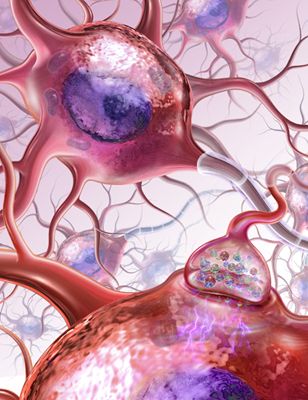
Using an AI tool, researchers at Karolinska Institutet have analysed brain images from 70-year-olds and estimated their brains’ biological age. They found that factors detrimental to vascular health, such as inflammation and high glucose levels, are associated with an older-looking brain, while healthy lifestyles were linked to brains with a younger appearance. The results are presented in Alzheimer’s & Dementia: The Journal of the Alzheimer’s Association.
Every year, over 20,000 people in Sweden develop some form of dementia, with Alzheimer’s disease accounting for approximately two-thirds of cases. However, the speed at which the brain ages is affected by various risk and health factors.
“Despite the recent introduction of new Alzheimer’s drugs, they will not work for everyone with dementia, so we want to study what can boost the brain’s resilience against pathological ageing processes” says the study’s lead author Anna Marseglia, researcher at the Department of Neurobiology, Care Sciences and Society, Karolinska Institutet.
AI-derived brain age
The study involved 739 cognitively healthy 70-year-olds, 389 of whom were female, recruited from Gothenburg’s H70 cohort in Sweden. The researchers took MRI scans of their brains and then estimated the age of the resulting brain images using their own AI-based algorithm.
“The algorithm is both accurate and robust, yet easy to use,” says principal investigator Eric Westman, professor of Neurogeriatrics at the same department. “It’s a research tool that still needs further evaluation, but our aim is for it also to be of clinical use in the future, such as in dementia investigations.”
The brain images were complemented with blood samples for measuring lipids, glucose, and inflammation. The participants also carried out cognitive testing. Data on lifestyle factors such as exercise and medical conditions were also available.
Brains with an older appearance
The AI tool estimated the brain age for both sexes to be on average 71 years. The researchers then looked at the ”brain age gap” by subtracting the participants’ estimated biological brain age from their chronological age.
The researchers found that diabetes, stroke, cerebral small vessel disease, and inflammation were linked to brains with an older appearance, whereas a healthy lifestyle involving regular exercise could be linked to brains of a younger appearance.
“A take-home from the study is that factors that adversely affect the blood vessels can also be related to older-looking brains, which shows how important it is to keep your blood vessels healthy, to protect your brain, by making sure, for instance, that your blood glucose level is kept stable,” says Anna Marseglia.
Studies of sex differences next
The brains of women and men seem to differ in terms of factors linked to older- and younger-looking brains, meaning that women and men may differ in how they build resilience, a phenomenon that the researchers now plan to investigate by looking not only at biological determinants such as hormones but also at sociocultural influences.
“Next year, we’ll launch a study to understand how social health – including social engagement, connectedness, and support – in middle and older age, along with sleep and stress, influence brain resilience, with a focus on women’s health factors,” says Anna Marseglia.
The study was primarily supported by grants from the Centre for Innovative Medicine, Forte, the Swedish Research Council, the Swedish Brain Foundation, the Swedish Alzheimer’s Foundation, the Swedish Dementia Foundations, the David and Astrid Hagelén Foundation, StratNeuro, the Foundation for Geriatric Diseases at Karolinska Institutet, the Loo and Hans Osterman Foundation for Medical Research, the Gamla Tjänarinnor Foundation and the Collaboratory on Research Definitions for Reserve and Resilience in Cognitive Aging and Dementia. No researcher from Karolinska Institutet has reported a conflict of interest, while co-author Silke Kern has declared ties with Roche, Geras Solutions, Optoceutics, Eli Lilly, Biogen and Bioarctic.
Publication: ”Biological brain age and resilience in cognitively unimpaired 70-year-old individuals”, Anna Marseglia, Caroline Dartora, Jessica Samuelsson, Konstantinos Poulakis, Rosaleena Mohanty, Sara Shams, Olof Lindberg, Lina Rydén, Therese Rydberg Sterner, Johan Skoog, Anna Zettergren, Silke Kern, Ingmar Skoog and Eric Westman, Alzheimer’s & Dementia, online 20 December 2024. doi: 10.1002/alz.14435.
